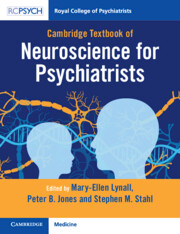Book contents
- Cambridge Textbook Of Neuroscience for Psychiatrists
- Reviews
- Cambridge Textbook of Neuroscience for Psychiatrists
- Copyright page
- Contents
- Contributors
- Introduction
- 1 Cells
- 2 Neurotransmitters and Receptors
- 3 Basic Techniques in Neuroscience
- 4 Neuroanatomy
- 5 Neural Circuits
- 6 Modulators
- 6.1 The Hypothalamic–Pituitary (Neuroendocrine) Axis
- 6.2 The Stress Response and Glucocorticoids
- 6.3 Adrenal Steroids
- 6.4 Inflammation and Immune Responses
- 7 Genetics
- 8 Neurodevelopment and Neuroplasticity
- 9 Integrated Neurobiology of Specific Syndromes and Treatments
- 10 Neurodegeneration
- Index
- References
6.1 - The Hypothalamic–Pituitary (Neuroendocrine) Axis
from 6 - Modulators
Published online by Cambridge University Press: 08 November 2023
- Cambridge Textbook Of Neuroscience for Psychiatrists
- Reviews
- Cambridge Textbook of Neuroscience for Psychiatrists
- Copyright page
- Contents
- Contributors
- Introduction
- 1 Cells
- 2 Neurotransmitters and Receptors
- 3 Basic Techniques in Neuroscience
- 4 Neuroanatomy
- 5 Neural Circuits
- 6 Modulators
- 6.1 The Hypothalamic–Pituitary (Neuroendocrine) Axis
- 6.2 The Stress Response and Glucocorticoids
- 6.3 Adrenal Steroids
- 6.4 Inflammation and Immune Responses
- 7 Genetics
- 8 Neurodevelopment and Neuroplasticity
- 9 Integrated Neurobiology of Specific Syndromes and Treatments
- 10 Neurodegeneration
- Index
- References
Summary
Although the term neuroendocrine is now applied to many different contexts in which the nervous system interacts with the endocrine system to regulate hormone release and bring about important changes in physiology, the hypothalamic–pituitary axis remains the best known and most well-characterised example of a neuroendocrine system. Here, the hypothalamus acts as the major coordinating centre, integrating a diverse array of intrinsic (e.g. higher cortical, autonomic, endocrine) and extrinsic (e.g. environmental) signals to direct the function of multiple different target cells/tissues within the central nervous system, pituitary gland and peripheral sites. Hypothalamic regulation of pituitary function has far-reaching consequences, governing the release of hormones from other key endocrine glands (e.g. adrenal, thyroid, gonad), which, in turn, regulate the function of many physiological pathways with important consequences for energy balance and metabolism, osmo- and thermo-regulation, heart rate and blood pressure control, central nervous system function, growth and reproduction.
- Type
- Chapter
- Information
- Cambridge Textbook of Neuroscience for Psychiatrists , pp. 287 - 299Publisher: Cambridge University PressPrint publication year: 2023

